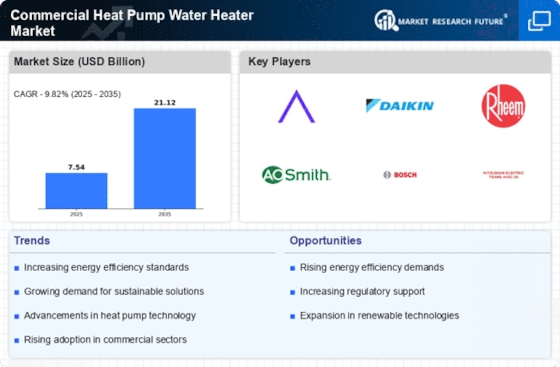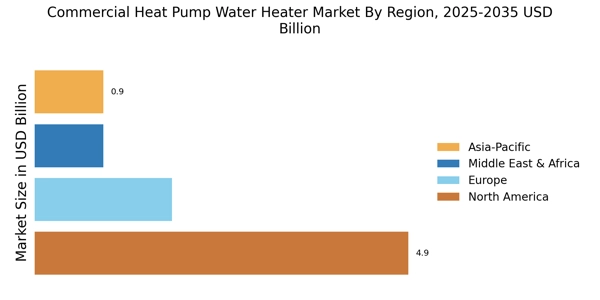Cost Savings and Operational Efficiency
Cost savings and operational efficiency are pivotal drivers in the Commercial Heat Pump Water Heater Market. Businesses are increasingly recognizing the long-term financial benefits of investing in heat pump technology. These systems typically offer lower operational costs compared to traditional water heating methods, primarily due to their energy-efficient design. For instance, heat pump water heaters can reduce energy consumption by up to 50%, leading to substantial savings on utility bills. Furthermore, the initial investment is often offset by these savings over time, making it an attractive option for commercial entities. As energy prices continue to fluctuate, the emphasis on cost-effective solutions is likely to propel the growth of the Commercial Heat Pump Water Heater Market.
Rising Demand for Sustainable Solutions
The Commercial Heat Pump Water Heater Market is experiencing a notable increase in demand for sustainable solutions. Businesses are increasingly prioritizing eco-friendly technologies to reduce their carbon footprint. This shift is driven by a growing awareness of environmental issues and the need for energy-efficient systems. According to recent data, the market for heat pump water heaters is projected to grow at a compound annual growth rate of approximately 10% over the next five years. This trend indicates a robust market potential as companies seek to align with sustainability goals and regulatory requirements. As a result, the Commercial Heat Pump Water Heater Market is likely to see a surge in adoption, particularly in sectors such as hospitality, healthcare, and education, where hot water demand is significant.
Government Incentives and Support Programs
Government incentives and support programs are significantly influencing the Commercial Heat Pump Water Heater Market. Many governments are implementing policies aimed at promoting energy efficiency and reducing greenhouse gas emissions. These initiatives often include financial incentives, such as tax credits and rebates, for businesses that invest in energy-efficient technologies. For example, programs that support the installation of heat pump water heaters can lower the upfront costs for commercial entities, making these systems more accessible. As regulatory frameworks continue to evolve, the Commercial Heat Pump Water Heater Market is likely to benefit from increased adoption driven by these supportive measures.
Growing Awareness of Energy Efficiency Standards
The growing awareness of energy efficiency standards is a key driver in the Commercial Heat Pump Water Heater Market. As energy regulations become more stringent, businesses are compelled to adopt technologies that meet or exceed these standards. The implementation of energy efficiency ratings and certifications has made it easier for consumers to identify high-performing products. This trend is particularly evident in sectors such as retail and manufacturing, where compliance with energy standards is critical. The push for energy-efficient solutions is expected to accelerate the adoption of heat pump water heaters, as they are often designed to meet these evolving requirements. Consequently, the Commercial Heat Pump Water Heater Market is poised for growth as businesses seek to enhance their energy performance.
Technological Innovations and Product Development
Technological innovations play a crucial role in shaping the Commercial Heat Pump Water Heater Market. Recent advancements in heat pump technology have led to the development of more efficient and reliable systems. Features such as smart controls, enhanced insulation, and variable speed compressors are becoming standard in new models. These innovations not only improve energy efficiency but also enhance user experience by providing better temperature control and reduced noise levels. The introduction of IoT-enabled systems allows for remote monitoring and management, further increasing operational efficiency. As manufacturers continue to invest in research and development, the Commercial Heat Pump Water Heater Market is expected to witness a wave of new products that cater to diverse commercial needs.


















